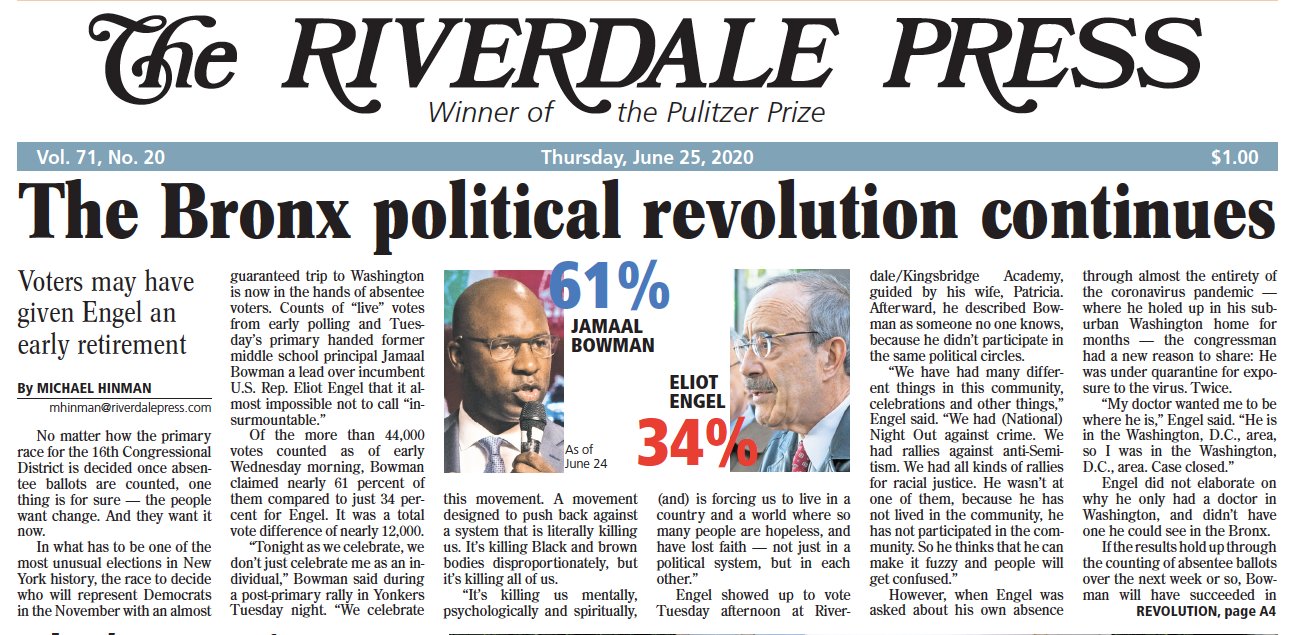Engel’s loss doesn’t doom pro-Israel Democrats
Longtime pro-Israel Rep. Eliot Engel’s defeat last week by Jamaal Bowman, a progressive who’s been critical of the Jewish state, doesn’t signal a Zionist wipeout.
Engel’s 16th CD includes Riverdale and Jewish areas in Westchester. It abuts the Bronx’s 15th CD, where Ritchie Torres is the apparent winner to replace retiring Rep. Jose E. Serrano.
In a district that is overwhelmingly Hispanic and black, with few Jewish voters, Torres is both progressive and pro-Israel. He was backed by mainstream pro-Israel PACs, including the Democratic Majority for Israel PAC and Pro-Israel America, as well as NORPAC, which leans right. He forcefully rejects leveraging aid to Israel.
Torres, who is gay, hates it when anti-Israel progressives accuse him of “pinkwashing” Israel. “I found it utterly baffling that you had LGBT activists doing the bidding of Hamas, which is a terrorist organization that executes LGBT people,” he told Jewish Insider.
Bowman, a middle school principal, has said assistance to Israel should be conditioned on its behavior.
President Donald Trump, speaking on Fox News’ “Hannity,” described the Engel-Bowman match as an example of how the “radical left” is taking over.
“Look at what happened. Eliot Engel was a pretty mainline guy,” Trump said. “He lost by like 37 points. He just got killed in the election we just had yesterday. He was supposed to be a shoo-in, and he got hit by a strong far-left candidate.”
Bowman responded with a statement that criticized Trump for being out of touch with what’s happening in the country, and using claims of radicalization to shield what could actually be considered racist comments, the Riverdale Press reported.
“Trump is using the same fear tactics that have always been used to malign Black leaders who want to reconstruct this nation,” Bowman said. “Trump doesn’t know a damn thing about being poor in this country. Millions of people in this country — not just Venezuela — lack access to food and water.”
“I’m a Black man who was raised by a single mother in a housing project. That story doesn’t usually end in Congress. But today, that 11-year old boy who was beaten by police is about to be your next representative,” Bowman said on the morning after the election. “I cannot wait to get to Washington and cause problems for the people maintaining the status quo.”
On election night, he told supporters, “You know what Donald Trump is more afraid of than anything else? A black man with power.”
“Jewish Republicans have had plenty of disagreements with Rep. Engel during his 32 years in Congress,” the Republican Jewish Coalition said. “But his defeat is a blow to the historically bipartisan support for Israel in the US Congress.”
Talk about reducing assistance to Israel has been ongoing for years, but until the current Congress it was an anomaly for both parties, an attention-getter for folks on the margin. In fact, before 2018, its most prominent advocate was Rand Paul, the Republican senator from Kentucky. Donald Trump the candidate flirted with the idea in 2016, on the very day in March he was set to address the American Israel Public Affairs Committee.
Virtually the only advocate for aid cuts among Democrats until 2018 was Rep. Betty McCollum, D-Minn., who framed her proposed cuts narrowly, tying them to the number of Palestinian minors in Israeli detention.
In 2018, victories by two Democrats who support the boycott Israel movement — Rashida Tlaib in Michigan and Ilhan Omar in Minnesota — were the most obvious signal that aid to Israel was not sacrosanct. But there were other signs: J Street flirted with the notion last year, and leading candidates for the nomination, including Sanders, Elizabeth Warren and Pete Buttigieg, were open to it.
Israel likely was not a factor among voters in the Engel-Bowman contest, but that may prove this point: Bowman’s expressed criticism of Israel did not spur Jewish voters — in a district where they are substantial — to vote against him.
Cutting aid, on the other hand, has hardly become an orthodoxy among progressives. Mondaire Jones is leading the pack in New York’s 17th (covering all of Rockland and part of Westchester counties) to replace Nita Lowey who, like Engel, is a Jewish pro-Israel leader is in a powerful position as chairwoman of the Appropriations Committee. Jones was the only candidate who had announced before Lowey said she was retiring, and he was setting up a campaign to challenge her from the progressive left — but Israel did not factor.
Jones, like most other Democrats, opposes Netanyahu’s proposal to annex parts of the West Bank, but otherwise he can’t praise Lowey enough when it comes to her Israel policies.
“I’m going to continue in the legacy of Nita Lowey in being a friend to Israel — we have to continue our security assistance,” he said last week at a debate organized by the Jewish Democratic Council of America.
In New York’s 12th District, Suraj Patel is neck and neck with Rep. Carolyn Maloney, the chairwoman of the Oversight Committee who attracted centrist pro-Israel financial backing. Patel challenged the longtime incumbent from the progressive left, but also told Jewish Insider that he emphatically opposes Israel boycotts, and has even before he publicly contemplated a political career — and was able to prove it.
A narrative emerging from Bowman’s victory is that centrist pro-Israel funding no longer matters: The Democratic Majority for Israel PAC reportedly dumped more than $1.5 million into the district, to little avail.
There is something to this, but it’s less that the impact of pro-Israel money has diminished and more that funding from other interests in the Democratic Party has increased. That’s been the case since 2004, when small online donors helped propel Howard Dean’s candidacy in the pre-primaries season, and MoveOn became a force to be reckoned with. Sanders’ endorsement of Bowman unleashed an army of donors. Outside groups spent more than $1.3 million on the newcomer’s behalf.
But pro-Israel funding still has an impact.
With Engel’s loss, the influential committee he chairs, the Foreign Affairs Committee, will remain in reliably centrist pro-Israel hands. His likely successors include Brad Sherman of California, Gregory Meeks of New York and Ted Deutch of Florida — all friends of AIPAC. But that’s a “short run” prediction. What 2022 and beyond brings in terms of committee chairmanships is susceptible to the broader vicissitudes in the party.
Bowman’s campaign seized on a moment of broader American unhappiness with the status of race in America, particularly in policing.
“I’m a Black man who was raised by a single mother in a housing project,” Bowman said in a victory statement. “That story doesn’t usually end in Congress. But today, that 11-year old boy who was beaten by police is about to be your next representative.”
Israel has not featured large in the protests, and as Mari Cohen wrote in Jewish Currents, Jewish groups are setting aside past divides over Israel with the Black Lives Matter movement to join them in solidarity now. The issue in 2016 was over a platform by a group called the Movement for Black Lives (one does that not bind the many diffuse groups that come together under Black Lives Matter). The platform accused Israel of “genocide” and “apartheid.”
Cohen reports that a new platform is under consideration. That could signal a big shift between BLM and the Jewish community.

 39.0°,
Fair
39.0°,
Fair 







